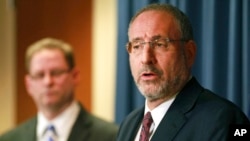Federal authorities charged 47 people in Minnesota with conspiracy and other counts in what they said Tuesday was the largest fraud scheme yet to take advantage of the COVID-19 pandemic by stealing $250 million from a federal program that provides meals to low-income children.
Prosecutors say the defendants created companies that claimed to be offering food to tens of thousands of children across Minnesota, then sought reimbursement for those meals through the U.S. Department of Agriculture's food nutrition programs. Prosecutors say few meals were actually served, and the defendants used the money to buy luxury cars, property and jewelry.
"This $250 million is the floor," Andy Luger, the U.S. attorney for Minnesota, said at a news conference. "Our investigation continues."
Many of the companies that claimed to be serving food were sponsored by a nonprofit called Feeding Our Future, which submitted the companies' claims for reimbursement. Feeding Our Future's founder and executive director, Aimee Bock, was among those indicted, and authorities say she and others in her organization submitted the fraudulent claims for reimbursement and received kickbacks.
Bock's attorney, Kenneth Udoibok, said the indictment "doesn't indicate guilt or innocence." He said he wouldn't comment further until seeing the indictment.
In interviews after law enforcement searched multiple sites in January, including Bock's home and offices, Bock denied stealing money and said she never saw evidence of fraud.
Earlier this year, the U.S. Department of Justice made prosecuting pandemic-related fraud a priority. The department has already taken enforcement actions related to more than $8 billion in suspected pandemic fraud, including bringing charges in more than 1,000 criminal cases involving losses in excess of $1.1 billion.
Federal officials repeatedly described the alleged fraud as "brazen," and decried that it involved a program intended to feed children who needed help during the pandemic. Michael Paul, special agent in charge of the Minneapolis FBI office, called it "an astonishing display of deceit."
Luger said the government was billed for more than 125 million fake meals, with some defendants making up names for children by using an online random name generator. He displayed one form for reimbursement that claimed a site served exactly 2,500 meals each day Monday through Friday — with no children ever getting sick or otherwise missing from the program.
"These children were simply invented," Luger said.
He said the government has so far recovered $50 million in money and property and expects to recover more.
The defendants in Minnesota face multiple counts, including conspiracy, wire fraud, money laundering and bribery. Luger said some of them were arrested Tuesday morning.
According to court documents, the alleged scheme targeted the USDA's federal child nutrition programs, which provide food to low-income children and adults. In Minnesota, the funds are administered by the state Department of Education, and meals have historically been provided to kids through educational programs, such as schools or day care centers.
The sites that serve the food are sponsored by public or nonprofit groups, such as Feeding Our Future. The sponsoring agency keeps 10% to 15% of the reimbursement funds as an administrative fee in exchange for submitting claims, sponsoring the sites and disbursing the funds.
But during the pandemic, some of the standard requirements for sites to participate in the federal food nutrition programs were waived. The USDA allowed for-profit restaurants to participate and allowed food to be distributed outside educational programs. The charging documents say the defendants exploited such changes "to enrich themselves."
The documents say Bock oversaw the scheme and that she and Feeding Our Future sponsored the opening of nearly 200 federal child nutrition program sites throughout the state, knowing that the sites intended to submit fraudulent claims.
"The sites fraudulently claimed to be serving meals to thousands of children a day within just days or weeks of being formed and despite having few, if any staff and little to no experience serving this volume of meals," according to the indictments.
One example described a small storefront restaurant in Willmar, in west-central Minnesota, that typically served only a few dozen people a day. Two defendants offered the owner $40,000 a month to use his restaurant, then billed the government for some 1.6 million meals through 11 months of 2021, according to one indictment. They listed the names of around 2,000 children — nearly half of the local school district's total enrollment — and only 33 names matched actual students, the indictment said.
Feeding Our Future received nearly $18 million in federal child nutrition program funds as administrative fees in 2021 alone, and Bock and other employees received additional kickbacks, which were often disguised as "consulting fees" paid to shell companies, the charging documents said.
According to an FBI affidavit unsealed earlier this year, Feeding Our Future received $307,000 in reimbursements from the USDA in 2018, $3.45 million in 2019 and $42.7 million in 2020. The amount of reimbursements jumped to $197.9 million in 2021.
Court documents say the Minnesota Department of Education was growing concerned about the rapid increase in the number of sites sponsored by Feeding Our Future, as well as the increase in reimbursements.
The department began scrutinizing Feeding Our Future's site applications more carefully and denied dozens of them. In response, Bock sued the department in November 2020, alleging discrimination, saying the majority of her sites were based in immigrant communities. That case has since been dismissed.




